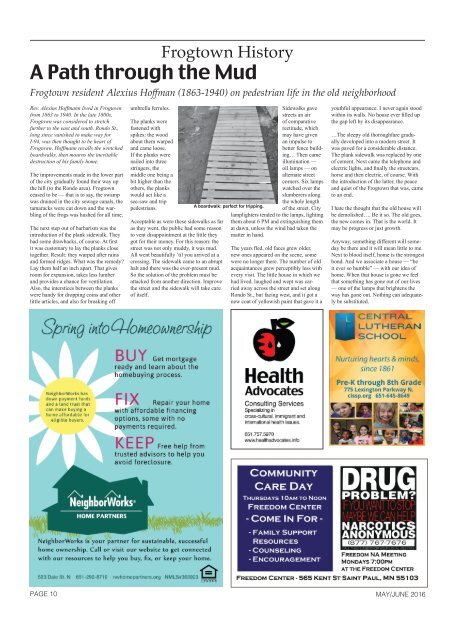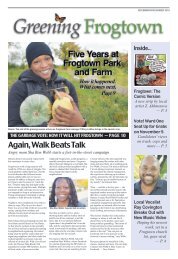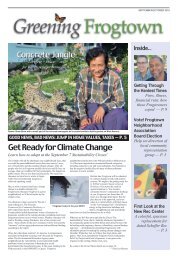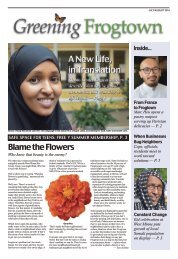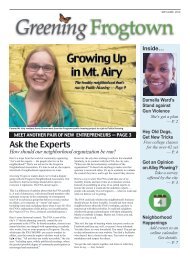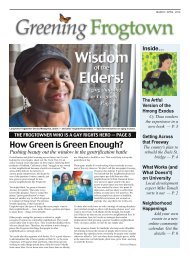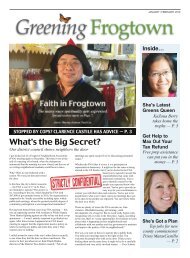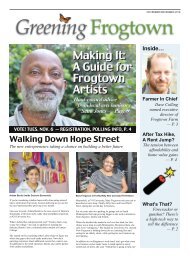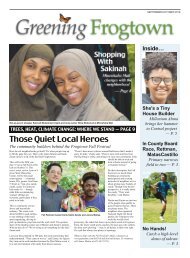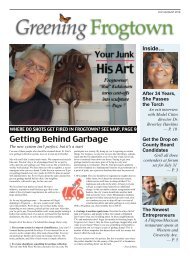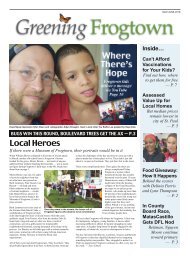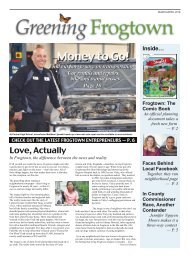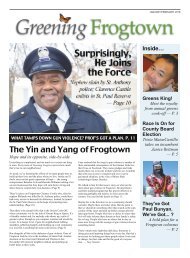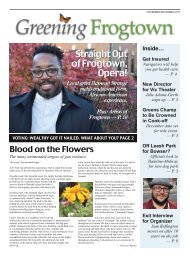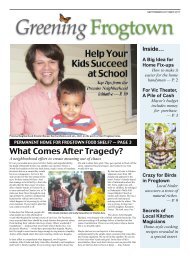You also want an ePaper? Increase the reach of your titles
YUMPU automatically turns print PDFs into web optimized ePapers that Google loves.
Frogtown History<br />
A Path through the Mud<br />
Frogtown resident Alexius Hoffman (1863-1940) on pedestrian life in the old neighborhood<br />
Rev. Alexius Hoffmann lived in Frogtown<br />
from 1863 to 1940. In the late 1800s,<br />
Frogtown was considered to stretch<br />
further to the east and south. Rondo St.,<br />
long since vanished to make way for<br />
I-94, was then thought to be heart of<br />
Frogtown. Hoffmann recalls the wretched<br />
boardwalks, then mourns the inevitable<br />
destruction of his family home.<br />
The improvements made in the lower part<br />
of the city gradually found their way up<br />
the hill (to the Rondo area). Frogtown<br />
ceased to be — that is to say, the swamp<br />
was drained in the city sewage canals, the<br />
tamaracks were cut down and the warbling<br />
of the frogs was hushed for all time.<br />
The next step out of barbarism was the<br />
introduction of the plank sidewalk. They<br />
had some drawbacks, of course. At first<br />
it was customary to lay the planks close<br />
together. Result: they warped after rains<br />
and formed ridges. What was the remedy?<br />
Lay them half an inch apart. That gives<br />
room for expansion, takes less lumber<br />
and provides a chance for ventilation.<br />
Also, the interstices between the planks<br />
were handy for dropping coins and other<br />
little articles, and also for breaking off<br />
umbrella ferrules.<br />
The planks were<br />
fastened with<br />
spikes: the wood<br />
about them warped<br />
and came loose.<br />
If the planks were<br />
nailed into three<br />
stringers, the<br />
middle one being a<br />
bit higher than the<br />
others, the planks<br />
would act like a<br />
see-saw and trip<br />
pedestrians.<br />
Acceptable as were these sidewalks as far<br />
as they went, the public had some reason<br />
to vent disappointment at the little they<br />
got for their money. For this reason: the<br />
street was not only muddy, it was mud.<br />
All went beautifully ’til you arrived at a<br />
crossing. The sidewalk came to an abrupt<br />
halt and there was the ever-present mud.<br />
So the solution of the problem must be<br />
attacked from another direction. Improve<br />
the street and the sidewalk will take care<br />
of itself.<br />
A boardwalk: perfect for tripping.<br />
Sidewalks gave<br />
streets an air<br />
of comparative<br />
rectitude, which<br />
may have given<br />
an impulse to<br />
better fence building…<br />
Then came<br />
illumination —<br />
oil lamps — on<br />
alternate street<br />
corners. Six lamps<br />
watched over the<br />
slumberers along<br />
the whole length<br />
of the street. City<br />
lamplighters tended to the lamps, lighting<br />
them about 6 PM and extinguishing them<br />
at dawn, unless the wind had taken the<br />
matter in hand.<br />
The years fled, old faces grew older,<br />
new ones appeared on the scene, some<br />
were no longer there. The number of old<br />
acquaintances grew perceptibly less with<br />
every visit. The little house in which we<br />
had lived, laughed and wept was carried<br />
away across the street and set along<br />
Rondo St., but facing west, and it got a<br />
new coat of yellowish paint that gave it a<br />
youthful appearance. I never again stood<br />
within its walls. No house ever filled up<br />
the gap left by its disappearance.<br />
…The sleepy old thoroughfare gradually<br />
developed into a modern street. It<br />
was paved for a considerable distance.<br />
The plank sidewalk was replaced by one<br />
of cement. Next came the telephone and<br />
electric lights, and finally the streetcars,<br />
horse and then electric, of course. With<br />
the introduction of the latter, the peace<br />
and quiet of the Frogtown that was, came<br />
to an end.<br />
I hate the thought that the old house will<br />
be demolished…. Be it so. The old goes,<br />
the new comes in. That is the world. It<br />
may be progress or just growth.<br />
Anyway, something different will someday<br />
be there and it will mean little to me.<br />
Next to blood itself, home is the strongest<br />
bond. And we associate a house — “be<br />
it ever so humble” — with our idea of<br />
home. When that house is gone we feel<br />
that something has gone out of our lives<br />
— one of the lamps that brightens the<br />
way has gone out. Nothing can adequately<br />
be substituted.<br />
PAGE 10<br />
MAY/JUNE 2016


